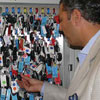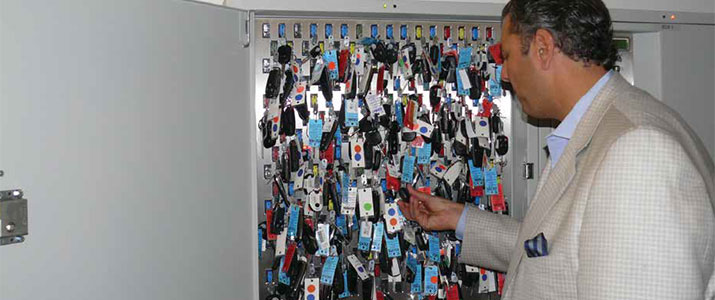
Take Control of the Wheel
Auto dealerships take a guarded approach to their keys
- By Fernando Pires
- Mar 01, 2014
 With the recent downturn in U.S. automotive sales, many
dealerships were left struggling. There were few options for
increasing revenue, and many were forced to cut expenses
through employee reductions, cutbacks in marketing and
selective pruning of operational services. But, as is often the
case, dealerships found newer and thriftier ways to manage business:
With the recent downturn in U.S. automotive sales, many
dealerships were left struggling. There were few options for
increasing revenue, and many were forced to cut expenses
through employee reductions, cutbacks in marketing and
selective pruning of operational services. But, as is often the
case, dealerships found newer and thriftier ways to manage business:
- Marketing reach was expanded through social media;
- internal processes were streamlined to increase productivity; and
- new technologies, such as automated key control systems, were implemented to
remedy operational vulnerabilities.
Control and management of physical keys was an obvious challenge for many
dealerships, as the cost of replacing lost keys could easily rise into the thousands
of dollars. A conventional vehicle key costs approximately $100 to replace, and a
replacement remote key fob may cost as much as $480. If a dealership, selling a
monthly average of 100 cars, lost 10 keys in a month, this would equate to a loss
of $1,000 for that single month in keys alone.
Mystery mileage and damage to the inventory as it relates to key control has
been another issue affecting the bottom line. Damaged vehicles that had been repaired
and vehicles with high mileage could no longer be sold as new. With no way
to confirm who last drove the vehicle and no enforceable accountability for managing
keys, these losses were often just chalked up to the cost of doing business.
The solution to these and other similar operational key management challenges,
both then and now, is an automated key management system. This computerized
key control system is designed specifically for securing and electronically
tracking vehicle keys in the dealership environment.
Key Control Delivers Multi-Faceted Solution
As many dealerships have discovered, not only does a key control system save
money by eliminating lost keys and mystery mileage, in the long run, it also helps
contribute to business operations. The system records all key activity, and the accumulated
data on key usage can be analyzed for inventory and sales effectiveness.
Slow movers can be more easily identified, as can the vehicles that are shown the
most and the least. The data points that emerge from tracking reports provide
valuable information for management.
Because of their space-saving design, key control cabinets can be wall mounted
in the showroom, providing quick, easy access to vehicle keys by the sales staff
when they have a customer waiting. To access a key, the sales person simply enters
his or her personal identification code and the stock number of the desired vehicle
key on the built-in keypad. If the information entered matches the information in
the system, the cabinet door unlocks and the requested key is illuminated.
The system automatically records who took the key, when it was taken and
when it was returned. It will also indicate if the requested key is not available, and
identify who has the key and how long it has been out. Keys can even be reserved
to ensure their availability for a scheduled test drive. The system’s electronic monitoring
capability helps prevent an employee from inadvertently taking a key home
at the end of the day instead of returning it to the cabinet.
Biometric access readers can be integrated into the system for a higher level
of security.
Networked Systems Streamline Operations
Key management systems that are networked provide even more control and efficiency
throughout the dealership. When a vehicle first arrives at the dealership,
it is moved into the pre-delivery inspection (PDI) department where it is inspected
and cleaned up.
Meanwhile, the keys are assigned a stock number and logged into the system.
Vehicle keys are stored in the PDI department and attached to a system key fob
known as a smartkey, as it provides tracking data each time it is removed from or
returned to a cabinet. Colored smartkeys can be used to distinguish between new
and used vehicles, cars and trucks, and so on.
When the vehicle is moved to the lot from the PDI area, the keys move to the
key control cabinet in the show room. The system automatically keeps track of the
vehicle’s whereabouts.
The streamlined procedure enabled by a key control system saves hours of paperwork
and significantly reduces the potential for mislabeling or misplacing keys.
In addition, attaching the vehicle key to a smartkey helps to thwart any thief who
might attempt to keep the key after test driving a demo car and replace it with a
counterfeit key with the intent to return later and drive off with the car.
Elsewhere in the dealership, key cabinets located in the service department can
be used to temporarily store keys for a customer’s car that is in for repair, recording
all access activity. Notes regarding fuel levels, mileage and the physical condition
of the car—scratches or dents—can be entered into the system along with notes to
help protect both the customer and the dealership while the car is being serviced.
As an added benefit, reports can be generated by the key control system to
provide a wealth of valuable information. Reports can be run at any point in time,
for any user and for any stock number. This data can be analyzed to determine
the average length of time of a test drive based on the amount of time the key
was logged out of the system, or to see which vehicles are generating the most
test drives. Depending on the information needed, management can review daily,
weekly and even hourly reports.
Time Saved is Money Earned
Information from the key control system is live, and at any time, management can
check the status of any key and its access history. This can be done either from a
computer or from a mobile device, providing even more flexibility and efficiency to
the system. A sales person engaged with a customer on the lot can quickly log into
the system on a tablet or mobile phone to see if keys are available for a test drive.
The benefits of adding a key control system to a vehicle dealership operation
are many. Management is able to control who accesses vehicle keys, enters the
system and takes a key, and how long the key may be kept out.
Running an automobile dealership in a shifting economy is
not easy. There are many ways to lose money—mismanagement
of keys should not be one of them.
This article originally appeared in the March 2014 issue of Security Today.